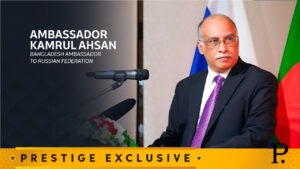Prestige: We’d like to start by exploring your transition from your previous role to becoming the Vice-Chancellor of Bangabandhu Sheikh Mujibur Rahman Maritime University.
Before taking on my role as the Vice-Chancellor of this prestigious university, I served as the Chairman of the Mongla Port. My transition to this role marked a significant shift from an operational role in a national economic hub like a seaport towards steering a top academic specialised university in the right direction. Our institution is unique, being the first of its kind in our country, a specialized university and the third in South Asia and twelfth globally. We take great pride in offering a comprehensive spectrum of maritime education, covering a wide array of disciplines.
Our academic offerings span from oceanography to naval architecture, offshore engineering, maritime law, maritime business, marine fisheries, and marine biotechnology. We’ve designed programs that range from undergraduate to postgraduate, encompassing Honors and Master’s degrees, as well as short courses under specialized institutes and departments for officers and employees from different maritime agencies. This wide coverage ensures that we address almost all facets of maritime education.
Currently, our university hosts over 1,000 students and offers nine Master’s programs and five Honors programs across 30 departments. We also house the Institute of Bay of Bengal and Bangladesh Studies (IBBBS). Our unique focus on the maritime sector and the knowledge we impart, combined with a commitment to research, propels toward academic excellence. At the heart of our mission is to provide maritime education, conduct research, and continually strive for excellence, ensuring that we nurture and advance every aspect of the maritime sector to harness the potentials of Maritime or Blue Economy.



Prestige: You’ve achieved significant success in various leadership roles. How do you plan to leverage those experiences to enhance the maritime education and research capabilities at BSMRMU?
My background is rooted in a diverse and extensive career spanning over three decades, with experiences in various positions in the Navy and different maritime sectors in the country and also internationally. I’ve undergone comprehensive training, served on ships of all types, served as an instructor at training schools/ centres, been worked at Headquarters, instructed at National Defence College (NDC), directed Blue Economy initiatives, and held command in ships and bases and as well as the Area Commander of the Dhaka and Khulna Naval areas. Prior to assuming the current role as Vice-Chancellor here, I served as the Chairman and as the Chief Executive Officer of the Mongla Port Authority (2nd biggest seaport of Bangladesh).
All these assignments demanded direct professional expertise, leadership, command, and the efficient management of ports which is crucial to supporting the national economy. Mongla Port, with its 70-year history, bears witness to my leadership and management skills, and its significance has multiplied with the connection of the Padma Bridge. The port now plays a pivotal role in handling increased imports and exports, including mega projects involving raw materials, major equipment and automobile transportation.
Now as Vice-Chancellor, I’m firmly convinced that this ‘Maritime University’ is the ideal place to deliver the highest academic excellence in maritime affairs. We have distinguished faculty members representing diverse fields, motivated students enrolled by their merit and the rich experiences from my career serve as a strong foundation for leading and guiding this institution towards greater academic achievement. 


Prestige: BSMRMU’s motto is “We Strive for Maritime Excellence.” Could you elaborate on the specific measures the university is taking to ensure the excellence of its programs and services?
Our university boasts an incredibly diverse and talented faculty, with experts in various disciplines such as oceanography, geology, naval architecture, port and shipping management, maritime business, all actively engaged in research and education. We maintain a robust infrastructure, with numerous specialized laboratories focused on fisheries and technology. As I’ve mentioned before, we operate from a bustling campus with over 1000 students, 400 teachers and staff. However, the future holds significant promise as we embark on a construction project of the Main Campus of the university in Chittagong, spanning 106 acres, which will shape the university’s destiny to hold 3000 students and 2800 faculty members and staff.
This new campus is poised to be the epicentre of our educational excellence, creating a brighter future for our institution. We’ve effectively established ourselves as a centre of maritime excellence and boast strong partnerships with stakeholders, both within our country and internationally. Globally, we’ve formed partnerships with 23 maritime universities/ institutions, fostering collaborations and exchange programs in higher education and research, enriching the experiences of our faculty and students alike.
Our commitment extends beyond traditional teaching, as we emphasize the development of entrepreneurial skills. This year, we took a momentous step by initiating a business incubation program and hosting our inaugural business plan competition. Our aim is to inspire the next generation of entrepreneurs in the maritime sector, drawing talent from diverse disciplines, including maritime law, oceanography, maritime logistics and fisheries. We actively engage with stakeholders, including port authorities, shipping companies, fisheries industries, and private firms, to understand their needs, challenges, and potential business ideas. We’re working collaboratively to nurture and launch these ideas into successful businesses.
At BSMRMU, we prioritize the safety and well-being of our students. We maintain a strict zero-tolerance policy against any form of ragging or sexual abuse, both within the campus premises and within our residential halls. Ensuring the health of our students is paramount to us, which is why we provide a fully-equipped medical facility that offers prompt and efficient emergency medical services. We believe in nurturing not only the minds but also the bodies of our students. To promote a healthy and active lifestyle, we offer access to well-equipped gym facilities on campus. Additionally, we understand the importance of easy mobility for our students. To facilitate their convenience, we provide reliable transport facilities
In the dynamic global landscape of the maritime sector, we see immense opportunities, from shipping and maritime transportation, marine fisheries, offshore energy to renewable energy sources and coastal and maritime tourism. We are actively promoting entrepreneurship in these areas, and the business plan competition has paved the way for a structured incubation program, where aspiring entrepreneurs will refine their concepts and bring them to market. This marks a significant milestone in our journey, as we continue to evolve and push the boundaries of what a maritime university can achieve, shaping the future of the maritime industry with innovative business ideas.



Prestige: Shed some light on the collaborations, especially partnerships with renowned international maritime universities. How have these collaborations enriched the educational experience and career opportunities for BSMRMU students?
Our students are encouraged to be well-rounded, with a keen awareness of how they can contribute to various maritime industries, whether in business or the medical sector. We foster an environment where they actively engage in discussions in the form of seminars and workshops and undertaking research to address the nuances and challenges within these fields. We focus on understanding the specific requirements necessary to promote their businesses effectively and encourage them to integrate research into their chosen subjects.
Additionally, we have already affiliated with five government marine academies, one government marine fisheries academy, and one private marine academy. The process of affiliation with the university is currently underway for other esteemed institutions, including the prestigious Bangladesh Naval Academy.
Our strong collaboration and coordination with major stakeholders, further enrich the learning experience. We regularly gather feedback from the corporate and industry leaders/ managers when they visit us, delving into their experiences, internships, and insights into their respective organizations. In turn, organizations approach us with their specific needs and expectations for students and interns, providing valuable recommendations.
This feedback loop ensures that our students receive real-time guidance and that our programs stay aligned with industry demands. It enables us to adapt and evolve, ultimately delivering graduates who are well-prepared and ready to meet the challenges of the dynamic maritime profession and business across the globe.



Prestige: Maritime education encompasses a wide range of disciplines. How does BSMRMU ensure a holistic approach to education, covering not only technical aspects but also environmental, legal, and managerial aspects of the maritime domain?
In the pursuit of successful mariculture in the sea, it is essential to understand the diverse marine species that can be cultivated effectively. While it’s a known fact that marine fishing accounts for only around 15% of tidal fishing, the potential within our vast fishing grounds remains largely untapped. To harness this potential, comprehensive research and sea surveys are indispensable. Specialized marine spatial planning is vital to identify the suitable areas for cost-effective and efficient fisheries. Simultaneously, we must exercise caution in overfished regions to prevent future issues within the fishing industry, striving for a natural balance in biodiversity and protecting Ecologically Critical Area (ECA).
Quality assurance is paramount to ensure the preservation and transport of seafood with the highest standards, catering to consumer expectations. Marketing strategies and cost-effectiveness in the industry play a pivotal role in reaching the full potential of our marine resources. Collaboration and knowledge-sharing with research centres, universities, and companies are crucial to keep students informed about practical industry scenarios and future transformation.
We also engage in advising and shaping government policies related to shipping, fishing, offshore energy, maritime tourism and environmental protection. This includes educating stakeholders on reducing greenhouse gas emissions, introducing new policies aligned with IMO and other maritime policy guidelines from national and other global maritime organizations, and promoting sustainable practices in the shipping industry. Safety protocols for port and cargo handling are integral to ensuring smooth trade, adhering to international standards.
Moreover, our initiatives extend to establish modern waste and spill management systems, ensuring a swift and efficient response to leaks or spills at sea. These pilot projects, like the one in Mongla Port, set the stage for addressing environmental challenges proactively and ensuring compliance of instructions and regulations to prevent sea and air pollution caused for shipping and other offshore activities.
In a global context, there is a growing emphasis on reducing greenhouse gas emissions in the shipping industry, with a target for net zero emissions by 2050. We actively work with industries to study and develop cleaner fuel and future ship designs that align with international regulations. In the highly regulated world of shipping, there is no room for concessions or reluctance; compliance with international standards is a fundamental requirement for sustainable and responsible marine practices.

Prestige: Maritime security and a sustainable blue economy are significant areas of focus in today’s world. How does BSMRMU incorporate these themes into its curriculum and research activities to address emerging global challenges?
In my interactions with different national maritime institutions, I emphasize into the intricate process of fostering economic activities within the realm of the blue economy. It’s a multifaceted initiative involving 26 diverse organizations, including government institutions and ministries, coming together under a unified umbrella to meticulously craft their short-term, mid-term and long-term plans. Central to this collective effort is the energy sector, particularly renewable energy sources like wind and tidal energy and maritime tourism, which hold immense untapped potential. While we possess significant numbers of offshore blocks in the sea, some of which are already being explored, there’s still vast untapped potential. This initiative seeks to harmonize and integrate various sectors, working collaboratively to achieve a shared objective in a faster pace to attain our desired objective.
One of the primary challenges we face in this pursuit is understanding the economic, societal and environmental impacts of our activities on the sea. To tackle these challenges, we need to cultivate a workforce equipped with the necessary skills and resources to manage these sectors efficiently. Maritime University like ours play a crucial role in preparing and guiding individuals for this purpose. Additionally, we have a significant responsibility in the prevention of marine pollution, addressing climate change like rising sea levels, and mitigating the considerable impact of climate change on the marine environment. These are the key aspects we address as we educate and run programs in functioning toward realizing the potential of the ‘Blue Economy’.




Prestige: The university has plans to establish a permanent campus. Could you provide some insights into the facilities and resources that will be available, and how they will contribute to shaping the emerging talents at the university?
Our under construction new university campus encompasses a vast area with 30 plus distinct buildings of varying sizes and unique architectural designs, housing essential facilities such as academic and administrative building, a state-of-the-art library, laboratory, model rooms, accommodation for students, teacher and staffs, a sports complex for recreational activities, meeting rooms for students, the academic council, syndicate, and senate meetings, advanced laboratories, model rooms, and even an ocean research vessel. Strategically located along the picturesque banks of the Karnaphuli River, our university enjoys a prime position that offers invaluable exposure and opportunities. To enhance our educational standards, we actively seek consultancy from Maritime Universities and institutions across the globe, drawing reference from their successful models. As part of our ambitious vision, we are planning to transition to the new campus within the next two to three years, ensuring an even more enriched, comprehensive and purpose-built educational facilities for our students.



Prestige: As the Vice-Chancellor of the university, what are your expectations for the graduates of BSMRMU, and how do you envision their roles in shaping the future of the maritime industry in Bangladesh and beyond?
I have high expectations for our students, envisioning them as efficient and successful Maritime professionals, entrepreneurs, and accomplished academicians taking into account the changing global perspective. We are actively collaborating with esteemed institutions like IMO and world-class Maritime Universities to enhance our educational and research standards. Our aim is to achieve global recognition for our university and ensure that every graduate holds a certificate of international standard. Our students have consistently demonstrated their competence through impactful collaborations with domestic and international organizations, benefitting our stakeholders and the Maritime industries of the country. We invite all stakeholders to join us in our mission, contributing to the holistic development of future Maritime professionals and thereby fostering the growth of our nation’s Maritime sector and the overall Blue Economy. Together, we can create a brighter future and sustainable maritime economy.








